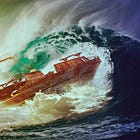All Men Want to Be Heroes
Fire Carrier Reading List on Man’s Timeless Need to Be a Hero
Last year, I was on a jog with a friend. As our small talk turned serious, he dropped the weight that had been on his shoulders:
“I’ve been struggling with depression all year. A lot of it, I think, stems from turning 40.”
I’m 36. I’m happy. But I immediately understood what he meant.
My age so often shocks me—not because I feel old, but because I wanted to have done something remarkable by now. I thought I’d have built something really amazing. And sometimes, I worry my window is closing, that I’m not on the trajectory I imagined.
The post I’m sharing today hit me with a kind of quiet clarity. Its title is simple, profound, and true. The article is just as sharp. It pulls back the curtain on a truth we rarely discuss and explores what it means for how we shape society.
Here are a few great excerpts that stood out:
A society should never entirely dismiss the appeal of the hero archetype, especially in the way it resonates with younger men; rather than try to make it profane, we should understand the need for it, and the good that can come from it. Being a hero doesn’t mean conquering and ruling. It means, first and foremost, serving a community, acting selflessly; the hero trades their physical suffering for communal praise, and a certain status...
Young people are supposed to break out of the mold instead of trying to follow in others’ footsteps. But from what I’ve observed, in my years of walking cities from Phnom Penh, Cambodia, to Buenos Aires, Argentina, the bulk of members of a society choose to, and would rather, play a stock character. People want a role in life: the hero, the joker, the damsel in distress.
A successful society will accept a person’s desire to play a role, and do its best to encourage and promote healthy archetypes that ordinary people can aspire to fulfill. In Japan, it might be the dedicated craftsperson. In England, the eccentric tinker. In France, the “five-hour smoking alone, pontificating on stuff he doesn’t really understand at the café” guy.
But every society needs to give men the opportunity to play the hero. It must praise the men who risk their physical safety for the greater good—not only the ones who are rescue workers or soldiers, but also the ones stringing power lines or drilling for oil or harvesting food, providing society with the necessities to run…
Without culturally approved ways to be a hero, a black market in unapproved, antisocial ones will pop up; these usually involve proving your worth through crime or violence.
Shortly after college, I came across two books that struck the same deep chord: Natural Born Heroes by Christopher McDougall and Tribe by Sebastian Junger.
If you come into my office, you’ll see both of these prominently featured next to my own book.
This article carries that same spirit. It’s one I keep coming back to and I think you’ll find it worth your time.
A Family Budgeting Tool that Works:
For years, I bounced between budgeting apps and DIY systems, but nothing stuck—until I found Monarch Money. It’s the first tool that actually helped my family build (and stick to) a clear, sustainable budget. If you’ve been meaning to take control of your finances, you can get 50% off your first year through this link.
Thank you for reading and sharing!
If you like this topic, check out these related posts:
Shane







My brothers and I always joke that our natural love language is being useful. With our wives and our households, we just want to be useful (and be seen as capable and heroic).
My brother insists on carrying his wife's suitcase. For years, she resisted but finally he had to tell her something like: "It's not that I think you're incapable of carrying it, it's that it makes me feel strong and important to do it for you. It's one of the ways that I show love."
In my own life, when people resist a helping hand (or when I insist on carrying six full bags of groceries at once so my wife and carry our son and nothing else...real men don't need two trips), I just say "it makes me feel like a big strong man."
It's a cheeky say of owning it but I begun to say it more and more, leaning to be unapologetic about needing to express me need to feel strong, capable, and heroic.